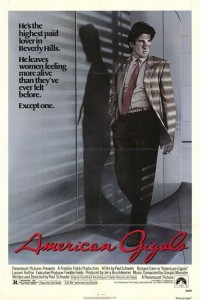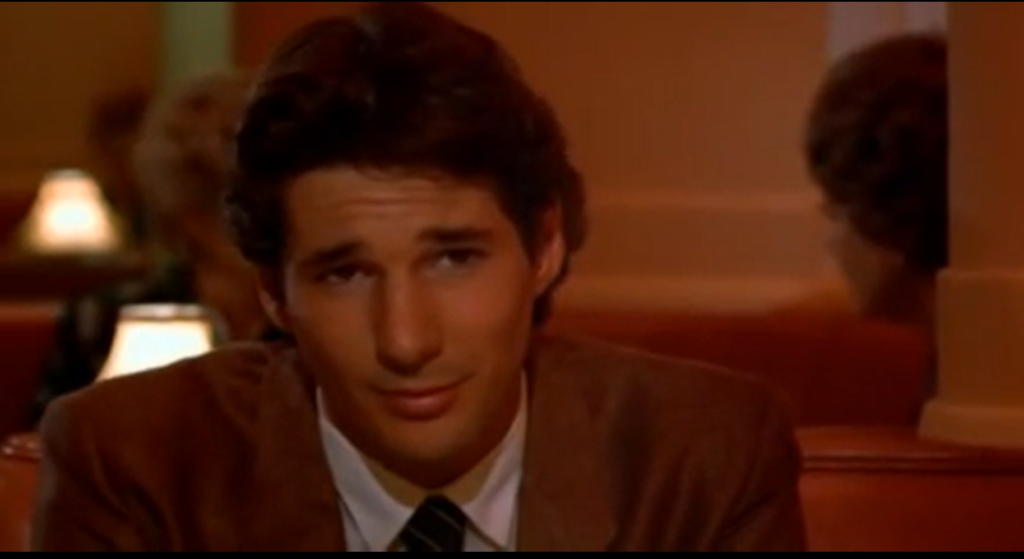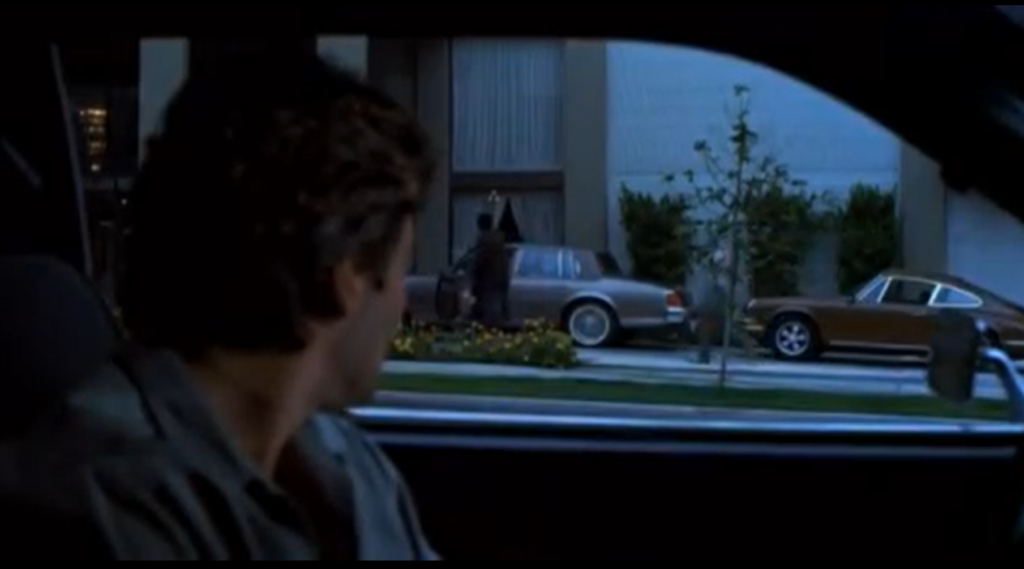“I made you! I taught you everything you know — how to dress, table manners, how to move, how to make love.”
|

Synopsis:
A high-paid gigolo (Richard Gere) is framed in the murder of a wealthy client, but is reluctant to expose his alibi (Lauren Hutton).
|
Genres, Themes, Actors, and Directors:
- Amateur Sleuths
- Framed
- Murder Mystery
- Paul Schrader Films
- Prostitutes and Gigolos
- Richard Gere Films
Response to Peary’s Review:
Peary loathes this flashy thriller, calling it a “thoroughly unconvincing, terribly made movie,” and arguing that it was made “solely to arouse viewers unaccustomed to seeing big stars like Gere taking such embarrassing roles.” I disagree. While I don’t think this film is up to the gritty standards of director Paul Schrader’s earlier outings — such as Blue Collar (1978) — he nonetheless manages to convincingly portray the loneliness experienced by a man like Gere, someone who commands top dollars for his services and lives a life of luxury, but ultimately (like all prostitutes) can’t buy his own fulfillment. In addition, the film contains many moments of genuine tension, especially during the final scenes as Gere is trying desperately to find the evidence that will exonerate him. While this isn’t a great movie — ultimately it’s too slick, and the romance between Gere and Hutton is underdeveloped — it’s certainly not the “ugly and dirty” piece of “trash” Peary makes it out to be.
Redeeming Qualities and Moments:
- Handsome young Richard Gere in an early role

- Atmospheric cinematography

Must See?
No, but it’s worth a look.
Links:
|



2 thoughts on “American Gigolo (1980)”
Ultimately a must.
Boy, Peary is really wrong on this one, apparently. Seems he doesn’t understand the film at all, strangely.
Hadn’t revisited this in many years – and, while watching, I found myself thinking for awhile that I wouldn’t “must” it just because I happen to like it. Sometimes personal taste doesn’t translate to the average ff.
However, as the film went on, I found myself ‘applauding’ its subversiveness in the realm of popular entertainment. Essentially, it’s a crime movie. But, as such, it plays against the rhythms of what we might expect from the genre. The movie takes its time, leisurely, for the sake of character development – the crime aspect actually takes a backseat.
I think the love story *is* sufficiently developed – we really do know all we need to know about the lovers. Gere senses that Hutton is what he’s been looking for for a long time. And we get the information to back that up. Love appears in an unexpected place. And that, to me anyway, is believable.
My main reason for making this a must is that the film is anchored in something simple yet powerful: someone is considered disposable – and others use that for their own ends.
I don’t always like Schrader’s films. But he’s a very shrewd filmmaker, and here I think he succeeds. Here he shows he knows what can lie in the underbelly of desire, and how that plays out in reality. Schrader is particularly observant in the details of the supporting players. He doesn’t seem to miss a trick in how people really maneuver their needs. There’s a significant segue into the gay underworld afoot here, but Schrader is sharp as he exposes duplicity everywhere.
I love the way the film opens; it’s a sharp attack. Giorgio Moroder’s score is on the money. And DP John Bailey does crisp work throughout.
Hutton turns in a surprisingly effective performance. And Gere acquits himself nicely: this is a role rooted in surface – and he manages to reach the needed depth.
I believe Schrader once wrote a book on Dreyer, Bresson and Ozu. You can see his admiration of them in this film.
Hmm. Whatever the merits of this film (and we can agree to disagree about them, in the same way your response disagrees with Peary), to my mind these are reduced by the voyeuristic exploitation of Gere’s physique and looks – right down to the shameless faux-tasteful nude shot of him standing god-like at the window in medium-to-long shot. In a special, cinematic sense, he is ‘framed’ so that we can take a good look at him in a similarly ‘special’ line-up. The degree to which this Schrader-frame is the main, and perhaps the only, point of the movie can be gauged by the number of windows, art frames, wall art, and so forth; further reinforcements are provided by the “I like to watch” theme, and the numerous vehicles for Gere, of which the snazziest would have to be the film itself.